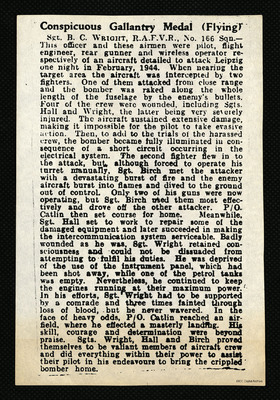Conspicuous Gallantry Award (Flying)
Title
Conspicuous Gallantry Award (Flying)
Description
Account of operation to Leipzig when aircraft was engaged by enemy fighters. Four of the crew were injured, two severely. Describes action of subsequent attacks. Sergeant Wright, although wounded and fainting three time continues to perform his duties keeping the engines running at maximum power.
Temporal Coverage
Language
Type
Format
One page printed document
Publisher
Rights
This content is available under a CC BY-NC 4.0 International license (Creative Commons Attribution-NonCommercial 4.0). It has been published ‘as is’ and may contain inaccuracies or culturally inappropriate references that do not necessarily reflect the official policy or position of the University of Lincoln or the International Bomber Command Centre. For more information, visit https://creativecommons.org/licenses/by-nc/4.0/ and https://ibccdigitalarchive.lincoln.ac.uk/omeka/legal.
Contributor
Identifier
SWrightBC1627924v10010
Transcription
Conspicuous Gallantry Medal (Flying)
Sgt. B.C. WRIGHT, R.A.F.V.R., No. 166 Sqn. – This officer and these airmen were pilot, flight engineer, rear gunner and wireless operator respectively of an aircraft detailed to attack Leipzig one night in February, 1944. When nearing the target area the aircraft was intercepted by two fighters. One of them attacked from close range and the bomber was raked along the whole length of the fuselage by the enemy’s bullets. Four of the crew were wounded, including Sgts. Hall and Wright, the latter being very severely injured. The aircraft sustained extensive damage, making it impossible for the pilot to take evasive action. Then, to add to the trials of the harassed crew, the bomber became fully illuminated in consequence of a short circuit occurring in the new electrical system. The second fighter flew in to the attack, but although forced to operate his turret manually, Sgt. Birch met the attacker with a devastating burst of fire and the enemy aircraft burst into flames and dived to the ground out of control. Only two of his guns were now operating, but Sgt. Birch used them most effectively and drove off the other attacker. P/O Catlin then set course for home. Meanwhile, Sgt. Hall set to work to repair some of the damaged equipment and later succeeded in making the intercommunication system serviceable. Badly wounded as he was, Sgt. Wright retained consciousness and could not be dissuaded from attempting to fulfil his duties. He was deprived of the use of the instrument panel, which had been shot away, while one of the petrol tanks was empty. Nevertheless, he continued to keep the engines running at their maximum power. In his efforts, Sgt. Wright had to be supported by a comrade and three times fainted through loss of blood, but he never wavered. In the face of heavy odds, P/O. Catlin reached an airfield, where he effected a masterly landing. His skill, courage and determination were beyond praise. Sgts. Wright, Hall and Birch proved themselves to be valiant members of aircraft crew and did everything within their power to assist their pilot in his endeavours to bring the crippled bomber home.
Sgt. B.C. WRIGHT, R.A.F.V.R., No. 166 Sqn. – This officer and these airmen were pilot, flight engineer, rear gunner and wireless operator respectively of an aircraft detailed to attack Leipzig one night in February, 1944. When nearing the target area the aircraft was intercepted by two fighters. One of them attacked from close range and the bomber was raked along the whole length of the fuselage by the enemy’s bullets. Four of the crew were wounded, including Sgts. Hall and Wright, the latter being very severely injured. The aircraft sustained extensive damage, making it impossible for the pilot to take evasive action. Then, to add to the trials of the harassed crew, the bomber became fully illuminated in consequence of a short circuit occurring in the new electrical system. The second fighter flew in to the attack, but although forced to operate his turret manually, Sgt. Birch met the attacker with a devastating burst of fire and the enemy aircraft burst into flames and dived to the ground out of control. Only two of his guns were now operating, but Sgt. Birch used them most effectively and drove off the other attacker. P/O Catlin then set course for home. Meanwhile, Sgt. Hall set to work to repair some of the damaged equipment and later succeeded in making the intercommunication system serviceable. Badly wounded as he was, Sgt. Wright retained consciousness and could not be dissuaded from attempting to fulfil his duties. He was deprived of the use of the instrument panel, which had been shot away, while one of the petrol tanks was empty. Nevertheless, he continued to keep the engines running at their maximum power. In his efforts, Sgt. Wright had to be supported by a comrade and three times fainted through loss of blood, but he never wavered. In the face of heavy odds, P/O. Catlin reached an airfield, where he effected a masterly landing. His skill, courage and determination were beyond praise. Sgts. Wright, Hall and Birch proved themselves to be valiant members of aircraft crew and did everything within their power to assist their pilot in his endeavours to bring the crippled bomber home.
Collection
Citation
“Conspicuous Gallantry Award (Flying),” IBCC Digital Archive, accessed November 7, 2024, https://ibccdigitalarchive.lincoln.ac.uk/omeka/collections/document/26767.
Item Relations
This item has no relations.

